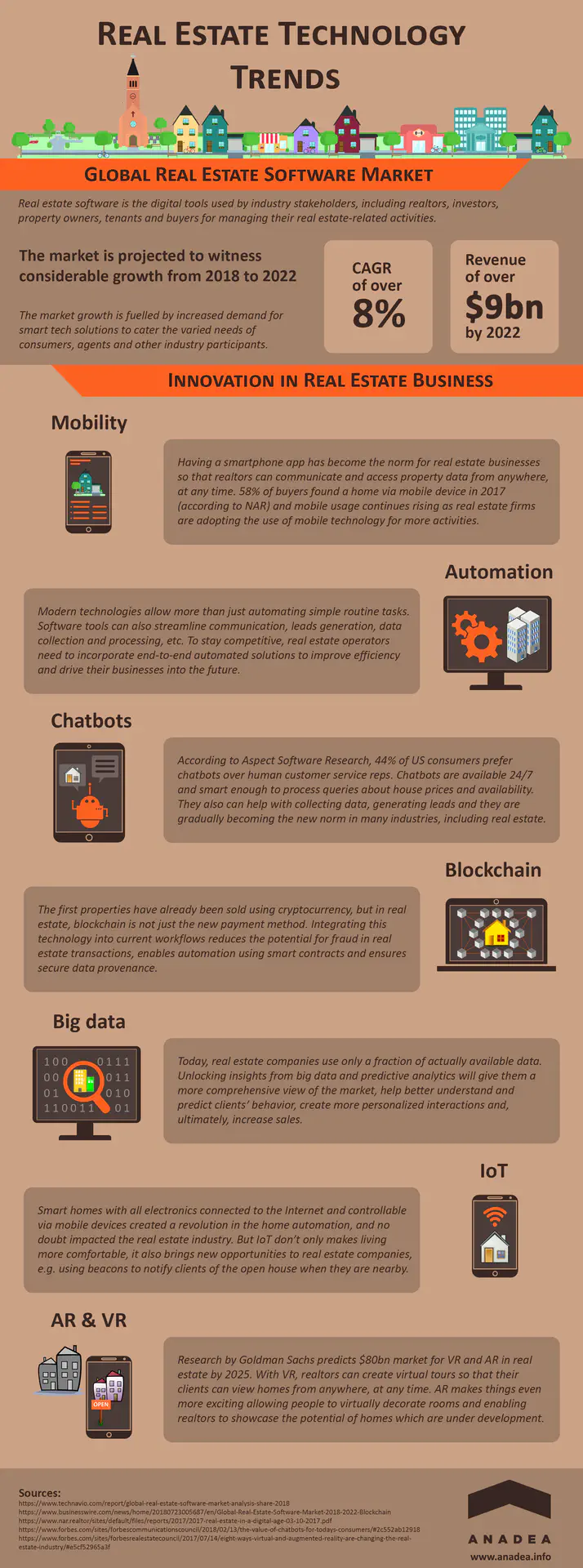What is the Future of the Real Estate Software Industry?

Real estate technology continues to thrive as the industry continues to grow and transform. With over 120 real estate startups, it’s no surprise that this sector is making a significant impact on the property industry.
Recent data shows that in 2021, the global real estate technology market size is estimated to reach $13.5 billion, with a projected compound annual growth rate (CAGR) of 12.5% from 2021 to 2028. This growth is due to the increasing adoption of digital solutions in the real estate sector.
In 2020, real estate tech companies raised a total of $9.9 billion, with notable deals including Opendoor’s merger with Social Capital Hedosophia Holdings Corp II, and a $700 million funding round for Compass. These investments demonstrate the confidence that investors have in the potential of real estate technology.
The future of real estate technology looks promising, with continued innovation and investment in digital solutions. It’s clear that technology will continue to transform the way we buy, sell, and manage properties, creating exciting opportunities for both consumers and industry professionals alike.
An overview of real estate tech
Software companies in this sector cover a wide series of categories. From new listing and search platforms, to marketplaces (residential and commercial), through to marketing, property and leasing management, DIY solutions for home sellers, financing and brokerage platforms, and numerous other solutions.
Zillow, StreetEasy, Trulia, easyProperty, Offerpad, Knock, Cozy Services, VTS and Nestio are just a handful of the players in the real estate software market that includes over 120 companies with billions behind them. CB Insights lists them all and where they sit in the market here.
Speaking in the Commercial Observer, Re:Tech founder Ashkan Zandieh (creator of a report on the state of this sector in 2017) said: “There are historically high valuation levels, and you’re seeing similar companies competing for the same transactions.”
Not all of this money is flowing from VC firms, which makes the funding dynamics different from other software sectors. Connell McGill, Co-founder/CEO of building data software firm Enertiv notes that “You have all these families where real estate is their core business, and now there are these new technologies that are aiming to disrupt their space or make their businesses more profitable,” McGill said. “These are families that have a significant amount of resources that can be invested [in real estate tech].”
What next for this sector?
Experts predict that investment in real estate tech will continue to rise in the coming years, with the market expected to reach $43.8 billion by 2025. This growth is driven by increasing demand for digital solutions in the real estate industry, as well as the potential for significant returns on investment.
Smaller players and competitors are likely to get acquired by more established well-funded firms. We can also anticipate some lateral moves, either through acquisitions, funding or strategic partnerships from adjacent and connected sectors, such as fintech and traditional financial companies.
We can except that in the next year or so, some real estate technology companies are going to break through into the mainstream, especially in the consumer-facing space. Some of these property tech startups are going to become as well known as Airbnb and WeWork. Finance-related solutions are going to further disrupt and improve the process of buying and managing property. Real estate agents and brokers are, as a natural part of what they do, going to promote the adoption of these services when they save them time and money.
Grey Wolf, an investment firm in this sector hosted a panel on the future of real estate technology at Wharton’s Zell Lurie Real Estate Center’s Fall Members Meeting. The consensus from that panel is “that technology will dramatically improve how real estate assets are managed. The future of real estate asset management is a technological future, that much is clear.”
How technology has changed the real estate industry?

Keep your finger on the pulse of innovation in real estate business and take advantage of new technologies! If you have a great idea and look for a trusted real estate software development company to bring it to life, drop us a line. Let’s build the future of real estate industry together!
Don't want to miss anything?
Subscribe and get stories like these right into your inbox.
Keep reading

AI in Real Estate | Use Cases, Benefits & What’s Next
Explore how AI is transforming the real estate industry – from property valuation and market forecasting to generative design and smart building management. Real-world use cases, trends, and expert insights from Anadea.

How to Build a Real Estate Marketplace in 2025
Thinking about launching a software product for the real estate industry? Find out how to create a real estate marketplace that will win the hearts of users.

How to Build a Real Estate CRM: Key Tips
The company’s success depends on its work with clients. Read this article to learn how to build a real estate CRM that will help you reach your business goals.
Contact us
Let's explore how our expertise can help you achieve your goals! Drop us a line, and we'll get back to you shortly.